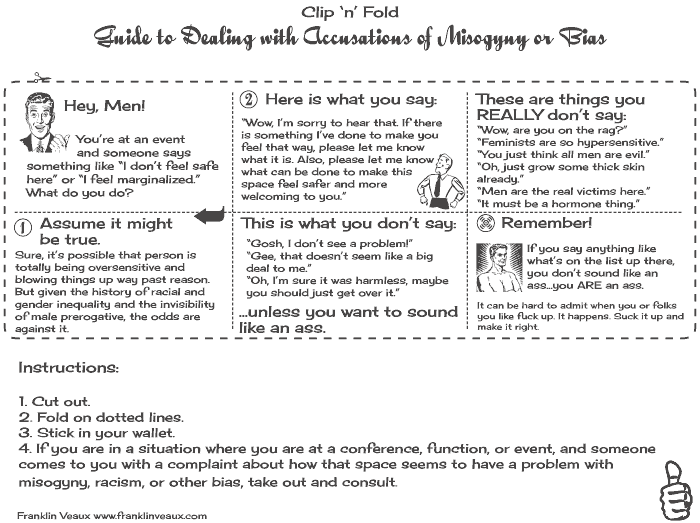Part 2 of this essay is here.
The largest producer of BDSM porn, by far, that I am aware of is Kink.com.They’re headquartered in the old Armory building in San Francisco, where they produce controversy, BDSM porn, and demonstrations, though as near as I can tell it’s only the second one that actually makes them money.
Bear with me for a minute; this is just backstory. I’m going to get all Ranty McRanterson in a minute here.
 Kink.com has something of a mixed reception in the BDSM community, as far as I’ve seen anyway, though my experiences with them have always been positive, and I quite like all the Kink.com folks I’ve met personally. (Their reception in the Christian anti-porn community is less mixed; when I was at Baycon talking to some of the folks who work for Kink, I heard stories about a Christian group who’d been picketing the Armory building with signs reading “End Torture Porn.” The irony in that is left as an exercise to the reader, though there was a part of me that wondered how many of the protesters were wearing crucifixes around their necks. But I digress.)
Kink.com has something of a mixed reception in the BDSM community, as far as I’ve seen anyway, though my experiences with them have always been positive, and I quite like all the Kink.com folks I’ve met personally. (Their reception in the Christian anti-porn community is less mixed; when I was at Baycon talking to some of the folks who work for Kink, I heard stories about a Christian group who’d been picketing the Armory building with signs reading “End Torture Porn.” The irony in that is left as an exercise to the reader, though there was a part of me that wondered how many of the protesters were wearing crucifixes around their necks. But I digress.)
Kink.com was founded by a guy with a genuine interest in BDSM, and one of the things the company has done is try in various ways to support and give back to the BDSM community. There are some folks who take exception to that, and an argument can always be made that it’s hard for a for-profit company of any kind to really have the best interests of the community that supports it at heart; having said that, I do believe their heart is in the right place.
Recently, one of the folks from Kink.com called me to talk about a new project they’re launching, the BDSM Pledge Web site. The idea, as I understand it, is to create a kind of BDSM ‘Code of Conduct’ that folks could sign on to, post on their Web sites, and so forth.
It hasn’t formally launched yet, and they’re still soliciting comments about it. My opinion is that it’s an interesting idea, but I’d like to see more from it. A lot more.
Before I get to the rant, I need to digress for a moment about two of the notions anyone who’s at all familiar with the BDSM world has almost certainly encountered: “SSC” (Safe, Sane, and Consensual) and “RACK” (Risk Aware Consensual Kink).
These are two different-but-not-really notions about what it is that sets BDSM apart from abuse. The SSC folks emphasize that BDSM activities should, naturally, be safe, sane, and consensual. The RACK folks rightly protest that the notions of ‘safe’ and ‘sane’ are highly subjective. No kind of sexual activity (and indeed no activity in general) can ever truly be ‘safe,’ and ‘sane’ is a pretty damn slippery concept that’s often used as a blunt instrument against folks who do things in bed that other folks don’t much like. It wasn’t that long ago, after all, that homosexuality was considered inherently ‘insane’ by the psychiatric community. They prefer instead to acknowledge the risk and say that BDSM is OK if the participants are aware of the risk and still consent to the activity.
Quite a lot of column inches have been wasted on the feud between these two camps. The BDSM Pledge comes down on the side of Safe, Sane, and Consensual, and the person I spoke to at Kink.com ruefully conceded that it’s got some of the RACK contingent’s backs up.
I personally am in neither camp. I think that both ideas are a load of bollocks.
Not because of what they say, mind you. I’ve written quite a lot about BDSM, and the issue of abuse is a central one, a defining element of kink as opposed to abuse. It’s what they don’t say that I find most annoying. Or, to be more precise, it’s the way that members of both camps often fail to apply their own principles that I most object to.
So here’s the part where I start to rant.
It has been my experience that the BDSM community as a whole gives a lot of lip service to the idea of ‘consent,’ but the practice doesn’t track with the preaching very well. I’ve already written about a friend of mine who was sexually assaulted by a prominent ‘leader’ in the BDSM community, but the problems that I see go beyond out-and-out assault.
The problems as I see them exist in three areas: constant, low-level non-consensual behavior, an inability to distinguish between consensual non-consent and real non-consent, and predatory behavior. And I think the three are all related.
Now, I’m absolutely not suggesting that everyone in the BDSM community is a bad person, of course. I’ve met many wonderful, interesting, compassionate, intelligent, friendly people in the community who are absolutely fantastic. Unfortunately, however, the bad actors can mess things up for the people who are fantastic.
And I’m not even saying the BDSM community is any worse than society as a whole. But we can, and must, do better.
First, there’s the low-level non-consensual stuff I sometimes see at a conferences or play parties. It most often manifests as harassment of submissives, particularly female submissives; people swat their asses as they walk by, give them orders without negotiating whether or not it’s appropriate to do so, and otherwise behave as if their boundaries are irrelevant. (This isn’t entirely limited to men harassing women; it’s happened to me at play parties when I’ve been with a partner who was holding the reins.) In its more subtle manifestation, it’s a disregard for, sometimes even extending to a refusal to acknowledge, anyone who’s clearly in a submissive role.
Look, I get it if that’s your kink. Really, I do. But here’s the thing. You see those two ideas up there? You see the word they have in common? It’s “consensual.” That means, the submissive consents to the activity. Nobody should ever make assumptions that it is okay to disregard someone’s boundaries, or to touch someone, merely because that person is a submissive. This should be common sense. If you haven’t asked, don’t touch.
The folks in Master/slave or “TPE” (Total Power Exchange) relationships get wrapped around the axle on the same point. I know I’m likely to catch a lot of flak for this, but listen, guys: It’s a fantasy. You may feel like you have a relationship that is a “true” or “real” Master/slave relationship, and you might even feel like those folks who aren’t in relationships are poseurs or players, but it’s still a fantasy. The millisecond, and I mean the millisecond, the “slave” stops granting consent, it’s over. And if you try to make it keep going on after that point, you’re not a dom. You’re a rapist. You may think you’re entitled to be a rapist, because total power exchange whatever whatever, but then every rapist always feels entitled to rape, so it’s not like you’re special on that point.
I had an acquaintance, many years ago, who carried on to great length about how he was a “true” master and his slave was “truly” his property and how other people could “play” at BDSM but for them it was real because he owned her just as surely as he owned his toaster and yadda yadda yadda. He kept on about it right up until the moment she served him with divorce papers. Poor guy was gobsmacked; he never saw it coming. One’s toaster does not normally walk away with custody of one’s child and alimony when it wants a change of scenery. Again, this should be obvious. No matter how firmly someone has convinced himself (and it’s almost always a “him,” though I’ve seen a couple of women fall into this trap) that he he really owns his slave really for reals, the instant that person stops consenting to the arrangement (even if part of the fantasy is that that person has given up consent), it’s done. Anyone who can’t acknowledge that fact is best left as a matter for the police, not the BDSM community, to deal with.
Which brings me to the third variety of problem person, the out-and-out predator.
These people are difficult to deal with. They’re charming. They often rise to positions within a community that gives them respect and power. They host parties. They teach lessons. And folks don’t want to deal with the fact that they are bad people.
We are, as a species, breathtakingly gifted at ignoring evil. Part of it is selfishness; we don’t want to lose access to the things they give the community–the play spaces, the parties, the instruction. We find them likable, and don’t want to believe bad things (and guys, seriously, if somebody says “so-and-so assaulted me” and your response is “Well, I’ve never had a problem with him,” that’s fucked up on so many levels it’s hard to know where to start). We find it easy to blame the victim if we do become aware of something hinkey going on. (Astonishingly, I’ve seen women do this to other women–“Well, she should have known what would happen if she agreed to play privately with him; why was she leading him on?” or “Well, if she was a REAL submissive, she would be GRATEFUL for what happened!”) We talk the talk about consent, but when an uncomfortable problem manifests in our faces, we find it hard to walk the walk.
This stuff–all of it–needs to stop.
Which brings me back to the BDSM code of conduct and the tussle between SSC and RACK.
Folks, I don’t care. SSC and RACK come at the same general idea from different directions. Fighting about which one is better is squabbling over who should put the dishes away while the house is burning down. It doesn’t matter how you define “safe” and “sane” or what level of risk is acceptable between consenting adults. What matters–what really matters–is acting like consent is important. Not just talking about it.
All the time. In little ways and big ways.
That means, no casually swatting some self-identified submissive on the ass just because you’re a big domly dom and you think she’s cute, and that’s what you do with submissives. That means recognizing that consent is always important. It always matters, even when part of the fantasy is that it doesn’t.
And that especially means not making excuses when other people fail to respect the boundaries of those around them.
Even when it’s inconvenient. Even when you think it might cost you something.
My friend edwardmartiniii has this to say on the subject of inappropriate or abusive behavior in a community: “Don’t allow this behavior in your social group. It’s your group and that means that it’s your job (as well the jobs of everyone else in the group) to not allow the behavior you find undesirable. It’s your job to stop it. The people who are doing it might be clueless, or they might be malevolent, and I guess you are going to have to make that call, but the bottom line is that you are responsible for policing yourself and those around you. If you see something, then speak up. Right then. Act.”
And I agree.
So I would like to see a code of ethics that goes beyond “be safe, sane, and consensual, negotiate, and respect limits.” I’d like to see something that covers a lot more ground: Understand that roles are roles, but people are people, and it is your responsibility as a decent human being to treat everyone with respect. Don’t make assumptions. Don’t step on boundaries because you think the roles permit it. Don’t excuse others who do.
There’s more, and in Part 2 of this article I plan to talk quite a lot more about the things I’d like to see the community do.
Before that, though, I’d like to hear your reactions. What do you think? What problems, if any, have you seen in your communities? What would a code of ethical conduct for the subcultures you belong to look like?
Like this:
Like Loading...





 Apparently, a prominent blogger named Rebecca Watson was harassed at TAM last year. And the fallout from her complaint about it, which I somehow managed to miss almost entirely, are still going on.
Apparently, a prominent blogger named Rebecca Watson was harassed at TAM last year. And the fallout from her complaint about it, which I somehow managed to miss almost entirely, are still going on.

 One of the panels I was on concerned the topic of defining alternative relationships. Throughout the panel, several folks, both on the panel and in the audience, referred to people who are neither polyamorous nor into BDSM by terms like ‘mundane’ and ‘muggle.’
One of the panels I was on concerned the topic of defining alternative relationships. Throughout the panel, several folks, both on the panel and in the audience, referred to people who are neither polyamorous nor into BDSM by terms like ‘mundane’ and ‘muggle.’ I am a pragmatist. I tend to be less concerned with how people “should” behave and more concerned with what sorts of behaviors actually work.
I am a pragmatist. I tend to be less concerned with how people “should” behave and more concerned with what sorts of behaviors actually work. When I lived in Tampa, I was for a number of years a regular host for PolyTampa, which appears to be as of this writing the longest-running polyamory support group in the country that’s still ongoing.
When I lived in Tampa, I was for a number of years a regular host for PolyTampa, which appears to be as of this writing the longest-running polyamory support group in the country that’s still ongoing. The elephant in the room is that people who create things deserve to be rewarded.
The elephant in the room is that people who create things deserve to be rewarded.